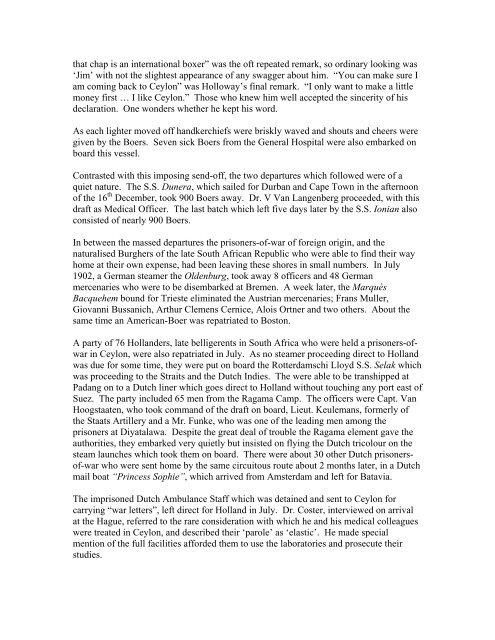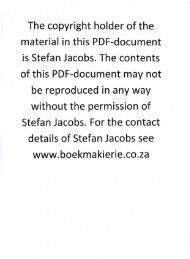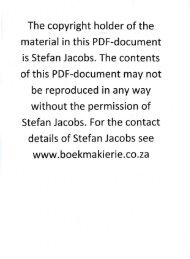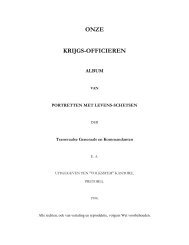Boere Krygsgevangenes in Ceylon - Boekmakierie.co.za
Boere Krygsgevangenes in Ceylon - Boekmakierie.co.za
Boere Krygsgevangenes in Ceylon - Boekmakierie.co.za
Create successful ePaper yourself
Turn your PDF publications into a flip-book with our unique Google optimized e-Paper software.
that chap is an <strong>in</strong>ternational boxer” was the oft repeated remark, so ord<strong>in</strong>ary look<strong>in</strong>g was<br />
‘Jim’ with not the slightest appearance of any swagger about him. “You can make sure I<br />
am <strong>co</strong>m<strong>in</strong>g back to <strong>Ceylon</strong>” was Holloway’s f<strong>in</strong>al remark. “I only want to make a little<br />
money first … I like <strong>Ceylon</strong>.” Those who knew him well accepted the s<strong>in</strong>cerity of his<br />
declaration. One wonders whether he kept his word.<br />
As each lighter moved off handkerchiefs were briskly waved and shouts and cheers were<br />
given by the Boers. Seven sick Boers from the General Hospital were also embarked on<br />
board this vessel.<br />
Contrasted with this impos<strong>in</strong>g send-off, the two departures which followed were of a<br />
quiet nature. The S.S. Dunera, which sailed for Durban and Cape Town <strong>in</strong> the afternoon<br />
of the 16 th December, took 900 Boers away. Dr. V Van Langenberg proceeded, with this<br />
draft as Medical Officer. The last batch which left five days later by the S.S. Ionian also<br />
<strong>co</strong>nsisted of nearly 900 Boers.<br />
In between the massed departures the prisoners-of-war of foreign orig<strong>in</strong>, and the<br />
naturalised Burghers of the late South African Republic who were able to f<strong>in</strong>d their way<br />
home at their own expense, had been leav<strong>in</strong>g these shores <strong>in</strong> small numbers. In July<br />
1902, a German steamer the Oldenburg, took away 8 officers and 48 German<br />
mercenaries who were to be disembarked at Bremen. A week later, the Marquès<br />
Bacquehem bound for Trieste elim<strong>in</strong>ated the Austrian mercenaries; Frans Muller,<br />
Giovanni Bussanich, Arthur Clemens Cernice, Alois Ortner and two others. About the<br />
same time an American-Boer was repatriated to Boston.<br />
A party of 76 Hollanders, late belligerents <strong>in</strong> South Africa who were held a prisoners-ofwar<br />
<strong>in</strong> <strong>Ceylon</strong>, were also repatriated <strong>in</strong> July. As no steamer proceed<strong>in</strong>g direct to Holland<br />
was due for some time, they were put on board the Rotterdamschi Lloyd S.S. Selak which<br />
was proceed<strong>in</strong>g to the Straits and the Dutch Indies. The were able to be transhipped at<br />
Padang on to a Dutch l<strong>in</strong>er which goes direct to Holland without touch<strong>in</strong>g any port east of<br />
Suez. The party <strong>in</strong>cluded 65 men from the Ragama Camp. The officers were Capt. Van<br />
Hoogstaaten, who took <strong>co</strong>mmand of the draft on board, Lieut. Keulemans, formerly of<br />
the Staats Artillery and a Mr. Funke, who was one of the lead<strong>in</strong>g men among the<br />
prisoners at Diyatalawa. Despite the great deal of trouble the Ragama element gave the<br />
authorities, they embarked very quietly but <strong>in</strong>sisted on fly<strong>in</strong>g the Dutch tri<strong>co</strong>lour on the<br />
steam launches which took them on board. There were about 30 other Dutch prisonersof-war<br />
who were sent home by the same circuitous route about 2 months later, <strong>in</strong> a Dutch<br />
mail boat “Pr<strong>in</strong>cess Sophie”, which arrived from Amsterdam and left for Batavia.<br />
The imprisoned Dutch Ambulance Staff which was deta<strong>in</strong>ed and sent to <strong>Ceylon</strong> for<br />
carry<strong>in</strong>g “war letters”, left direct for Holland <strong>in</strong> July. Dr. Coster, <strong>in</strong>terviewed on arrival<br />
at the Hague, referred to the rare <strong>co</strong>nsideration with which he and his medical <strong>co</strong>lleagues<br />
were treated <strong>in</strong> <strong>Ceylon</strong>, and described their ‘parole’ as ‘elastic’. He made special<br />
mention of the full facilities afforded them to use the laboratories and prosecute their<br />
studies.





